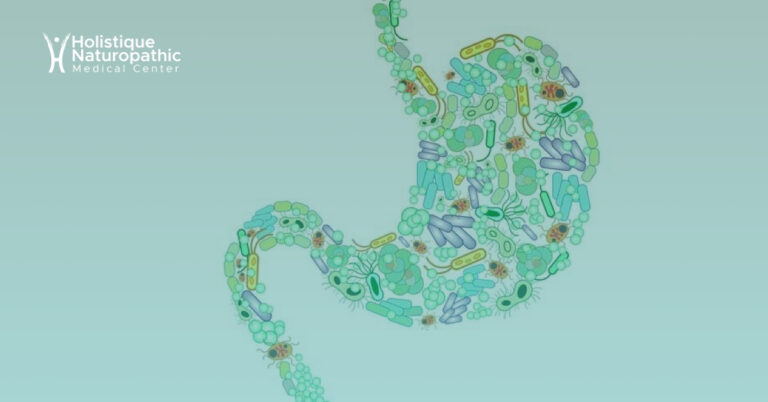
Antibiotics and The Gut Microbiota
Did you know there are more bacterial cells in your body than human cells? Well, at least in cell count since bacteria are much smaller thus have less mass.
A 2016 study at the Weizmann Institute of Science in Israel found that our total cell count is approximately 57 percent bacteria. So, by that measure, we make up only 43% of the body’s total cell count; the rest are microscopic bugs.
The gut microbiota has co-evolved with us over millennia and provides benefits in many ways, including, but not limited to, digestion, production of vitamins and absorption of minerals, detoxification, protection against pathogens, and regulation of the immune system. The importance of this interaction is highlighted by the fact that 70 to 80% of the body’s immune cells are found in the gut.
Over the last 70+ years, antimicrobial agents have been successful in fighting infectious diseases, dramatically reducing rates of illness and death worldwide. While it remains a very important part of current medical treatment, its widespread use has led to an increase in antibiotic resistance, reducing the drugs’ effectiveness.
Additionally, science is now discovering that overuse of antibiotics has the unintended consequence of reducing or removing resident bacteria that are critical for gut health. These changes in the microbiome have now been linked to contributing to a whole new set of diseases ranging from allergies, autoimmune disease, neurological disorders such as Parkinson’s, depression, and even cancers.
While there is absolutely a time and place for antibiotics, they should only be used when truly necessary. Even a single antibiotic treatment contributes to the risk of developing resistance and leads to long-lasting detrimental shifts in the gut microbiome.
On average, one course of antibiotics disturbs the microbiota for 16 months. Clindamycin, one of the worst offenders, disturbs the microbiota for 18 to 24 months. Triple antibiotic therapy for H. pylori leads to long-lasting derangements in the composition of the commensal flora lasting up to four years.
Antibiotics are not the only medications that disrupt the microbiome. Proton Pump Inhibitors (PPIs) such as Prilosec and Nexium decrease populations of small bowel bifidobacterial within seven days of initiating therapy. They also elevate the risk of small intestinal bacterial overgrowth (SIBO).
Bifidobacteria, one of the major genera of bacteria that primarily makes up the lower gastrointestinal tract, is important for the production of the inhibitory neurotransmitter GABA, as well as for the production of short-chain fatty acids, the main fuel for enterocytes which heals and seals the gut lining.
Non-Steroidal Anti-Inflammatory Drugs (NSAIDs) like aspirin and ibuprofen reduce populations of beneficial flora including bifidobacterial and lactobacilli, the other major genera of bacteria that colonizes the most in the small intestine.
So how can you keep your gut microbiome robust? First off, consider adding more traditionally fermented and cultured foods to your diet, whether you are taking antibiotics or not. One of the best and least expensive ways to optimize your gut microbiome is to eat fermented-rich foods and prebiotics such as:
- sauerkraut
- kimchi
- kefir
- miso
- onions
- garlic
- leeks
- asparagus
- Jerusalem artichoke, and plenty more.
While probiotic supplements can also be beneficial, it cannot replace a healthy diet rich in organic, fiber-rich produce which more powerfully creates an optimal environment for beneficial bacteria in your gut, while decreasing pathogenic bacteria, fungi, and yeast.
If you must take an antibiotic, be sure to also take a high-quality or spore-based probiotic. To ensure the bacteria’s survival, take the probiotic a few hours before or after taking the antibiotic. Lastly, aim to minimize your stress and practice mindfulness, those little resident bugs inside will thank you!
-Homan Rabizadeh, ND
References:
Cotter, P. D., Stanton, C., Ross, R. P., & Hill, C. (2012). The impact of antibiotics on the gut microbiota as revealed by high throughput DNA sequencing. Discovery Medicine, 13(70), 193–199. https://pubmed.ncbi.nlm.nih.gov/22463795/
Gu, Q., & Li, P. (2016). Biosynthesis of Vitamins by Probiotic Bacteria. Probiotics and Prebiotics in Human Nutrition and Health. https://doi.org/10.5772/63117
Hawrelak, J., & Myers, S. (2004). Intestinal Dysbiosis Review Permission. Alternative Medicine Review X, 9. http://archive.foundationalmedicinereview.com/publications/9/2/180.pdf
Jernberg, C., Löfmark, S., Charlotta Edlund, & Jansson, J. K. (2010, November). Long-term impacts of antibiotic exposure on the human intestinal microbiota. ResearchGate; Society for General Microbiology. https://www.researchgate.net/publication/45640137_Long-term_impacts_of_antibiotic_exposure_on_the_human_intestinal_microbiota
Lo, W., & Chan, W. W. (2013). Proton Pump Inhibitor Use and the Risk of Small Intestinal Bacterial Overgrowth: A Meta-analysis. Clinical Gastroenterology and Hepatology, 11(5), 483–490. https://doi.org/10.1016/j.cgh.2012.12.011
Marlicz, W., Loniewski, I., Grimes, D. S., & Quigley, E. M. (2014). Nonsteroidal anti-inflammatory drugs, proton pump inhibitors, and gastrointestinal injury: contrasting interactions in the stomach and small intestine. Mayo Clinic Proceedings, 89(12), 1699–1709. https://doi.org/10.1016/j.mayocp.2014.07.015
Montenegro, L., Losurdo, G., Licinio, R., Zamparella, M., Giorgio, F., Ierardi, E., Di Leo, A., & Principi, M. (2014). Non steroidal anti-inflammatory drug induced damage on lower gastro-intestinal tract: is there an involvement of microbiota? Current Drug Safety, 9(3), 196–204. https://doi.org/10.2174/1574886309666140424143852
Sender, R., Fuchs, S., & Milo, R. (2016). Revised Estimates for the Number of Human and Bacteria Cells in the Body. PLOS Biology, 14(8), e1002533. https://doi.org/10.1371/journal.pbio.1002533
Valdes, A. M., Walter, J., Segal, E., & Spector, T. D. (2018). Role of the gut microbiota in nutrition and health. BMJ, 361, k2179. https://doi.org/10.1136/bmj.k2179
Wallace, J. L., Syer, S., Denou, E., de Palma, G., Vong, L., McKnight, W., Jury, J., Bolla, M., Bercik, P., Collins, S. M., Verdu, E., & Ongini, E. (2011). Proton Pump Inhibitors Exacerbate NSAID-Induced Small Intestinal Injury by Inducing Dysbiosis. Gastroenterology, 141(4), 1314-1322.e5. https://doi.org/10.1053/j.gastro.2011.06.075
Wu, H.-J., & Wu, E. (2012). The role of gut microbiota in immune homeostasis and autoimmunity. Gut Microbes, 3(1), 4–14. https://doi.org/10.4161/gmic.19320
Yan, F., & Polk, D. B. (2011). Probiotics and immune health. Current Opinion in Gastroenterology, 27(6), 496–501. https://doi.org/10.1097/mog.0b013e32834baa4d
Zyga, L. (2013, February 15). We are living in a bacterial world, and it’s impacting us more than previously thought. Phys.org; Phys.org. https://phys.org/news/2013-02-bacterial-world-impacting-previously-thought.html

